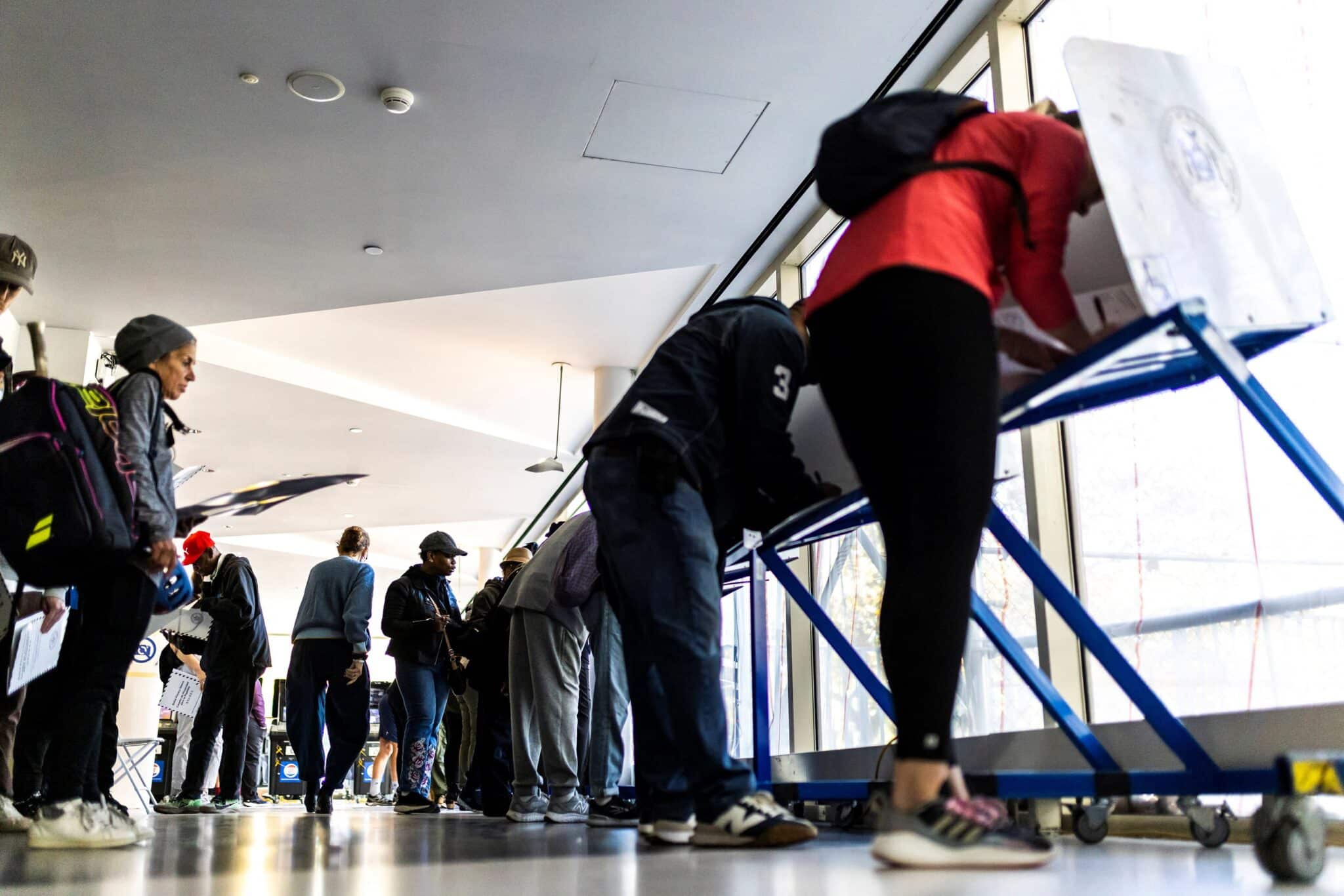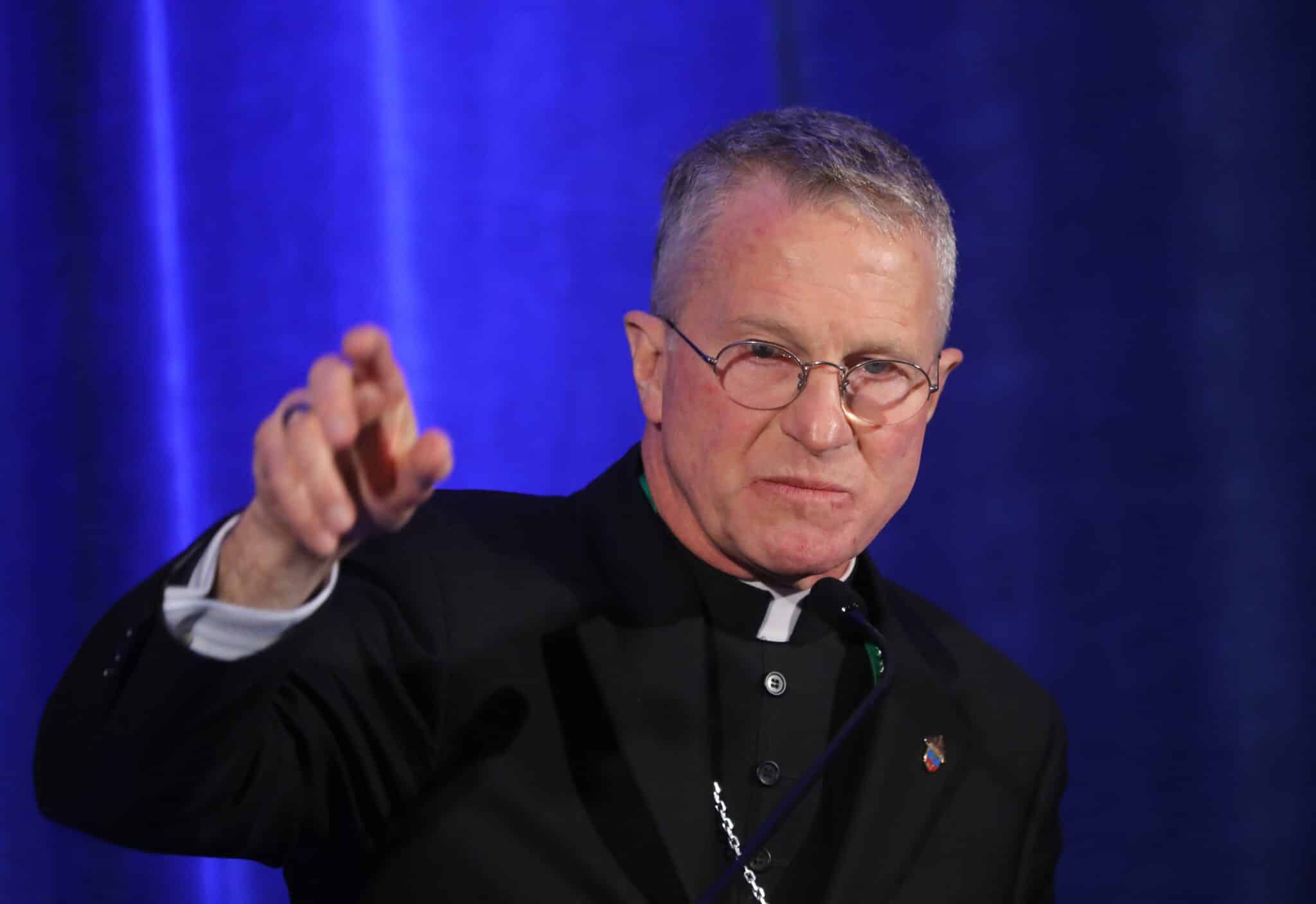(OSV News) — On the evening of March 21, hundreds of people joined the peaceful demonstration “Be Not Afraid: March and Vigil for Human Dignity” organized by the Diocese of El Paso, Texas, along with migrant-supporting organizations such as Hope Border Institute, and religious and community leaders from areas along the U.S.-Mexico border.
Organizers called the event “a watershed moment of community resistance and prayer” in response to the Texas Legislature’s passage of Senate Bill 4, controversial legislation passed in November that makes it a state crime for migrants to cross the border into the state of Texas without authorization.
Because the federal government is responsible for border protection, lawsuits have questioned the state law’s constitutionality, and a series of federal judges temporarily blocked its implementation as those challenges play out in court. SB 4 was briefly in effect after a divided U.S. Supreme Court March 19 lifted the temporary pause on the law and sent the matter back to the lower court due to a procedural error there. But in response, the U.S. 5th Circuit Court of Appeals in New Orleans ruled late March 19 to continue to temporarily block the implementation of SB 4 as it prepares for a related hearing.
The bill’s controversy coincides with Texas Attorney General Ken Paxton’s lawsuit seeking to shut down Annunciation House, a Catholic non-profit organization that serves immigrants, as well as the first anniversary of the fire that killed 40 people and injured about two dozen more in a migration detention center across the border from El Paso in Ciudad Juarez, Mexico.
The community responded massively. Hundreds of demonstrators gathered March 21 at El Paso’s San Jacinto Plaza, where they heard speeches from Bishop Mark J. Seitz of El Paso; Auxiliary Bishop Anthony C. Celino, as well as Bishop Michael Hunn of the Episcopal Diocese of Rio Grande.
“Divine Master, let us not forget that we are a pilgrim people exposed to persecution, but a people who walk in peace because we carry the strength of love,” said Bishop Seitz, leading those gathered in prayer.
“We are here tonight calling for policies that respect the dignity of every human being,” Bishop Hunn said. “We will stand together and we will not tolerate having our religious freedoms restricted by asking us to find out if they have papers before we treat people as a neighbor. We will love our neighbor.”
The voices of religious leaders were joined by community leaders and representatives of immigrant advocacy groups, such as Annunciation House and Las Americas Immigrant Advocacy Center that serve the immigrant community in the border area between Ciudad Juarez and El Paso.
“Let us remember that we are gathered tonight because a year ago, for lack of hospitality, people were rounded up off the streets of Juarez, crowded into an immigration detention facility that was set on fire and 40 lives were lost,” said Ruben Garcia, Annunciation House director. “At the heart of that, is the call to hospitality; let us all be hospitable every day, day after day.”
Throughout the event, there were many expressions of support for Garcia and his organization, which has provided humanitarian assistance on the southern border for more than four decades. On March 11, a state judge temporarily blocked the Texas attorney general’s demands for Annunciation House records, stating that Paxton’s effort appeared to be politically motivated with a “predetermined” outcome in mind, and must go through the appropriate due process in the state court system.
Paxton’s lawsuit against Annunciation House, as well as the passage in Texas of SB 4, came in a context in which some Republican leaders in Texas have become increasingly hostile to non-governmental organizations, including Catholic ones, that provide resources such as food and shelter to migrants along the U.S.-Mexico border.
At the March 21 event, Bishop Celino told the marchers that the time has come to act. “Faith and hope demand action that bears fruit in justice. Tonight, we recommit ourselves to remain faithful to the struggle for justice,” he said. “We are not afraid and we will not keep our voices quiet when so many brothers and sisters, parents, children, grandparents are fleeing danger, from hunger, poverty and oppression.”
The auxiliary bishop stressed that human dignity is a God-given right, which was why “we lift up our voices tonight and say, ‘We have hope,'” said the bishop, repeating the phrase in Spanish. He added that the community stands in solidarity with “the tremendous work of Annunciation House, its workers, its residents, the humanitarian workers in the migrant shelters and, especially, its devoted director, Ruben Garcia.”
After the speeches, the demonstrators left San Jacinto Plaza and processed down Oregon Street while chanting in unison, “We have hope.”
They marched to Sacred Heart Catholic Parish, where the vigil began with the faithful of different parishes processing in with banners of their ministries and apostolates, traditional folkloric dancers and a group of priests, as well as representatives of other religious traditions.
In addition to demanding respect for the human dignity of migrants throughout the march and vigil, the demonstrators remembered 40 migrants from Colombia, Ecuador, El Salvador, Guatemala, Honduras and Venezuela who died in the fire March 27, 2023. The names and nationalities were spoken while a candle was lit in their memory.
During the vigil, representatives of organizations defending the rights of migrants and civic leaders were also present.
“Do not be afraid, we can face it, we are not alone, we are together,” said Bishop Seitz, while asking the attendees to walk together as they advocate for the human dignity of migrants with the faith and hospitality that makes them brothers in Christ.
A moving moment in the evening was when Garcia introduced Wilson Alexander Juarez Hernandez, a survivor of the fire from Guatemala, who was 21 years old at the time. Garcia explained how his health has been improving after coming close to death. Currently, Hernandez is receiving medical treatment in the United under a humanitarian visa.
Toward the end of the vigil, prayers were offered for religious leaders, immigration reform, and the hearts of legislators; for the workers and volunteers who provide humanitarian assistance; and for immigrants who have died and continue to die in the search for a better life for themselves and their loved ones.
At the closing of this meeting, Bishop Seitz thanked the religious representatives who came to the vigil, including Bishop Jose Guadalupe Torres Campos of Ciudad Juarez; Auxiliary Bishop of Greg Kelly of Dallas; and Anthony Granado, secretary general for social policy at the United States Conference of Catholic Bishops.
Bishop Seitz also prayed in Spanish, saying, “Merciful God and Father of All, awaken us from the sleep of indifference, open our eyes to their suffering and deliver us from the insensitivity born of comfort and self-centeredness.”
“Inspire us to see that those who arrive at our borders are our brothers and sisters, may we share with them the blessings we have received from your hand and recognize that together we are one human family,” he prayed. “We are all migrants who walk with hope towards you, our true home, where we will be at peace and safe in your embrace.”
By Marietha Góngora V. | OSV News







News & Commentary
‘We have hope’ say advocates at El Paso march and vigil for migrants’ dignity
(OSV News) — On the evening of March 21, hundreds of people joined the peaceful demonstration “Be Not Afraid: March and Vigil for Human Dignity” organized by the Diocese of El Paso, Texas, along with migrant-supporting organizations such as Hope Border Institute, and religious and community leaders from areas along the U.S.-Mexico border.
Organizers called the event “a watershed moment of community resistance and prayer” in response to the Texas Legislature’s passage of Senate Bill 4, controversial legislation passed in November that makes it a state crime for migrants to cross the border into the state of Texas without authorization.
Because the federal government is responsible for border protection, lawsuits have questioned the state law’s constitutionality, and a series of federal judges temporarily blocked its implementation as those challenges play out in court. SB 4 was briefly in effect after a divided U.S. Supreme Court March 19 lifted the temporary pause on the law and sent the matter back to the lower court due to a procedural error there. But in response, the U.S. 5th Circuit Court of Appeals in New Orleans ruled late March 19 to continue to temporarily block the implementation of SB 4 as it prepares for a related hearing.
The bill’s controversy coincides with Texas Attorney General Ken Paxton’s lawsuit seeking to shut down Annunciation House, a Catholic non-profit organization that serves immigrants, as well as the first anniversary of the fire that killed 40 people and injured about two dozen more in a migration detention center across the border from El Paso in Ciudad Juarez, Mexico.
The community responded massively. Hundreds of demonstrators gathered March 21 at El Paso’s San Jacinto Plaza, where they heard speeches from Bishop Mark J. Seitz of El Paso; Auxiliary Bishop Anthony C. Celino, as well as Bishop Michael Hunn of the Episcopal Diocese of Rio Grande.
“Divine Master, let us not forget that we are a pilgrim people exposed to persecution, but a people who walk in peace because we carry the strength of love,” said Bishop Seitz, leading those gathered in prayer.
“We are here tonight calling for policies that respect the dignity of every human being,” Bishop Hunn said. “We will stand together and we will not tolerate having our religious freedoms restricted by asking us to find out if they have papers before we treat people as a neighbor. We will love our neighbor.”
The voices of religious leaders were joined by community leaders and representatives of immigrant advocacy groups, such as Annunciation House and Las Americas Immigrant Advocacy Center that serve the immigrant community in the border area between Ciudad Juarez and El Paso.
“Let us remember that we are gathered tonight because a year ago, for lack of hospitality, people were rounded up off the streets of Juarez, crowded into an immigration detention facility that was set on fire and 40 lives were lost,” said Ruben Garcia, Annunciation House director. “At the heart of that, is the call to hospitality; let us all be hospitable every day, day after day.”
Throughout the event, there were many expressions of support for Garcia and his organization, which has provided humanitarian assistance on the southern border for more than four decades. On March 11, a state judge temporarily blocked the Texas attorney general’s demands for Annunciation House records, stating that Paxton’s effort appeared to be politically motivated with a “predetermined” outcome in mind, and must go through the appropriate due process in the state court system.
Paxton’s lawsuit against Annunciation House, as well as the passage in Texas of SB 4, came in a context in which some Republican leaders in Texas have become increasingly hostile to non-governmental organizations, including Catholic ones, that provide resources such as food and shelter to migrants along the U.S.-Mexico border.
At the March 21 event, Bishop Celino told the marchers that the time has come to act. “Faith and hope demand action that bears fruit in justice. Tonight, we recommit ourselves to remain faithful to the struggle for justice,” he said. “We are not afraid and we will not keep our voices quiet when so many brothers and sisters, parents, children, grandparents are fleeing danger, from hunger, poverty and oppression.”
The auxiliary bishop stressed that human dignity is a God-given right, which was why “we lift up our voices tonight and say, ‘We have hope,'” said the bishop, repeating the phrase in Spanish. He added that the community stands in solidarity with “the tremendous work of Annunciation House, its workers, its residents, the humanitarian workers in the migrant shelters and, especially, its devoted director, Ruben Garcia.”
After the speeches, the demonstrators left San Jacinto Plaza and processed down Oregon Street while chanting in unison, “We have hope.”
They marched to Sacred Heart Catholic Parish, where the vigil began with the faithful of different parishes processing in with banners of their ministries and apostolates, traditional folkloric dancers and a group of priests, as well as representatives of other religious traditions.
In addition to demanding respect for the human dignity of migrants throughout the march and vigil, the demonstrators remembered 40 migrants from Colombia, Ecuador, El Salvador, Guatemala, Honduras and Venezuela who died in the fire March 27, 2023. The names and nationalities were spoken while a candle was lit in their memory.
During the vigil, representatives of organizations defending the rights of migrants and civic leaders were also present.
“Do not be afraid, we can face it, we are not alone, we are together,” said Bishop Seitz, while asking the attendees to walk together as they advocate for the human dignity of migrants with the faith and hospitality that makes them brothers in Christ.
A moving moment in the evening was when Garcia introduced Wilson Alexander Juarez Hernandez, a survivor of the fire from Guatemala, who was 21 years old at the time. Garcia explained how his health has been improving after coming close to death. Currently, Hernandez is receiving medical treatment in the United under a humanitarian visa.
Toward the end of the vigil, prayers were offered for religious leaders, immigration reform, and the hearts of legislators; for the workers and volunteers who provide humanitarian assistance; and for immigrants who have died and continue to die in the search for a better life for themselves and their loved ones.
At the closing of this meeting, Bishop Seitz thanked the religious representatives who came to the vigil, including Bishop Jose Guadalupe Torres Campos of Ciudad Juarez; Auxiliary Bishop of Greg Kelly of Dallas; and Anthony Granado, secretary general for social policy at the United States Conference of Catholic Bishops.
Bishop Seitz also prayed in Spanish, saying, “Merciful God and Father of All, awaken us from the sleep of indifference, open our eyes to their suffering and deliver us from the insensitivity born of comfort and self-centeredness.”
“Inspire us to see that those who arrive at our borders are our brothers and sisters, may we share with them the blessings we have received from your hand and recognize that together we are one human family,” he prayed. “We are all migrants who walk with hope towards you, our true home, where we will be at peace and safe in your embrace.”
By Marietha Góngora V. | OSV News